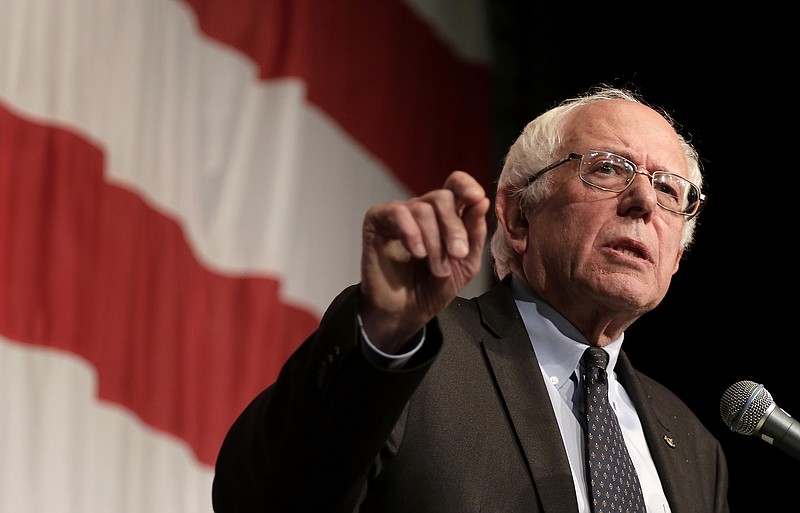GREENVILLE, S.C. (AP) - Democratic presidential hopeful Bernie Sanders sought to broaden his appeal with black voters Friday in speeches denouncing "institutional racism" in the American political and economic system.
The Vermont senator addressed an overwhelmingly white crowd in the Republican stronghold of Greenville, South Carolina, as he made his case that "racism still remains a much too real part of American life." He's expected to meet privately with black leaders while in the state.
"There is no one who will fight harder not only to end institutional racism, but to make fundamental changes in our broken criminal justice system," he said, drawing roars from the crowd of almost 3,000.
He struck a similar chord Friday evening in front of another 2,000-plus people in the capital city of Columbia. That crowd was younger than in Greenville, but no more racially diverse.
Sanders called for banning the for-profit prison industry, demilitarizing local police forces and restoring portions of the Voting Rights Act struck down by the Supreme Court.
South Carolina hosts the South's first presidential primary and is the first state in the nominating process to have a large number of black voters, who could make up a majority of the Democratic primary electorate in the state.
Sanders and his aides acknowledge he must get more black support, in South Carolina and other states, to win the nomination over Hillary Rodham Clinton.
"The senator realizes that racial inequality and economic inequality are parallel issues that must be addressed simultaneously, and I think he wants to make that clear," said spokeswoman Symone Sanders, who is not related to him.
Sanders will continue his two-day tour of South Carolina with at least two public events Saturday. It's his first extended campaign trip here first since he canceled a swing after the June massacre in which a white gunman killed nine people in a historically black church in Charleston.
Sanders spoke about the killings in his remarks, along with the death of Walter Scott, a 50-year-old black man who was killed in the spring after a traffic stop by a North Charleston police officer. The white officer has since been fired and charged with murder.
"For a variety of reasons you have seen these murders on television," Sanders said, naming other black citizens who died in police altercations, "but they have gone on for decade after decade and decade."
The senator endorsed community policing, where officers work more closely with residents. "Most police officers are honest and trying to do their best," Sanders said in Columbia, noting that he worked with officers when serving as a mayor. "But, as in the case with any other public official, when a police officer breaks the law, that officer must be held accountable."
Sanders called for the Justice Department to "be much more active" in prosecuting "hate groups" like those followed by accused Charleston shooter Dylann Roof. "These are the types of groups that educated that sick man that committed that atrocity," he said.
Sanders' South Carolina speech came as he tries to establish a relationship with people in the Black Lives Matter movement and other African-American leaders. The senator received criticism from the movement after activists took over a recent Sanders campaign rally, only to be booed by Sanders supporters.
He has since hired Symone Sanders, a prominent supporter of Black Lives Matter, as his press secretary. She confirmed Friday that he will meet privately with black elected officials, ministers and other community leaders while in South Carolina.
Rosemary Wallace, a Sanders backer from Rock Hill, South Carolina, said the senator's lack of standing among black voters is more about unfamiliarity than anything else.
"He resonates, especially when he's talking about the prison system ... jobs, education, opportunity, all the issues we want to hear about," she said. "He's just got to reach out and get people like me involved."
Clinton, meanwhile, announced endorsements this week from two previous Democratic governors of South Carolina, Richard Riley and Jim Hodges. Clinton aides say she will be in the state again soon.
In her first White House bid, Clinton led South Carolina polls for months, but black support quickly peeled away to then-Sen. Barack Obama after he won the 2008 caucuses in overwhelmingly white Iowa. Obama then trounced Clinton here on his way to winning the nomination and the presidency, with black voters forming a key part of his national coalition.
A potential wild card in both Sanders' and Clinton's maneuvering in South Carolina could be Vice President Joe Biden, who is weighing whether to seek the nomination. Biden has deep ties among Democrats in South Carolina, black and white.
___
Follow Barrow at https://twitter.com/BillBarrowAP .
